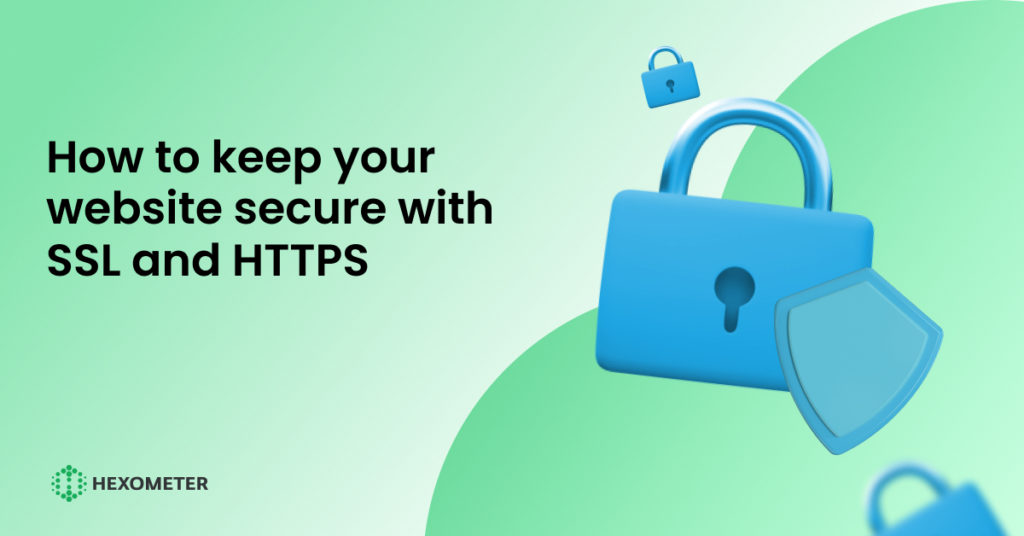With cybercrime on the rise, it is essential for eCommerce businesses to keep their website secure with SSL and HTTPS. This blog post will cover how your site stands at a risk of compromise without an SSL certificate or HTTPS; why it’s important to use these protocols for security purposes; and finally, what you need to do in order to set up SSL and HTTPS.
What is an SSL certificate?
Let’s start with the basics – what is an SSL certificate?
Think of the function of the lock at your house. It primarily exists to ensure that you and your family are safe from intruders, creeps, and thieves. In that regard, an SSL certificate is a lock at your website.
An SSL certificate, also known as a digital security certificate, can protect your website and the information you collect from hacking. It does this by encrypting all of the data that goes between your computer and visitors’ computers in a secure connection.
The newer, more improved SSL version is the TSL (Transport Security Layer) which initially uses the same encryption method used by SSL to secure data management and transfer but is a tad bit more advanced.
How to check if a page is protected by SSL?
Now that we know what an SSL certificate is let’s learn how to check for it. Luckily for us, checking if a site is secure and has an SSL certificate issued is more or less the easiest job in the world.
You can do this by going into the address bar on any browser. firstly look at the URL, does it start with HTTPS? Next look for a green padlock next to the URL in question. If there isn’t one then it means that your site has not yet been switched over and probably doesn’t have secure encryption enabled which could result in some serious consequences.
How SSL Works
SSL works through two mechanisms within one procedure. Let’s look at both of those:
Asymmetric Encryption Method
The first step that concerns us is the asymmetric step, “the TSL handshake.” It’s a handshake because it’s a two-way process and uses two keys. Basically, you can use these keys to exchange data between one front of the browser and the other.
The first key is used by the user in which data is presented to the server safely, and the second key is the one used by the browser to encrypt the data. The use of two keys is in place because of the process of public-key cryptography.
The first key is called the public key, and it gathers data in an encrypted form that can only be decrypted by the second key, which is a private key that the server holds.
Symmetric Encryption Method
After the TSL handshake, there’s a symmetric transfer of information within the server using “session keys.” Once the public and private keys have made the exchange, the same session keys work within the server to encrypt information. The nature of these session keys is temporary, and new session keys are created for every new information set.
Why Your Company Needs an SSL Certificate
SSL certificates are so important that Google Chrome made it a point to get an SSL certificate, or else it would show a warning called “unsecured connection” to its users to give them a better experience!
Imagine your site showing an “unsecure connection” pop up every time a visitor tries to access it.
Not very attractive, is it?
But lack of aesthetics is not the only reason you need to have an SSL certificate! In fact, there are several reasons why getting an SSL certificate is crucial to your online business.
SEO optimization
Many studies have shown that users prefer HTTPS websites which leads to a lower bounce rate, which means more traffic. This can also be a reason of rankings drop.
Security
Securing your client’s information is as vital as securing your own. It not only helps in keeping clients, but it also adds up to your respect and reputation.
How To Choose Which SSL Certificate You Need?
There are different types of SSL certificates based on budget and scope, these include:
1. Basic domain SSL (these are economical and use standard encryption to product one domain)
2. Organization SSL (you can validate these types of certificates at the organization level and they require 3rd party validation)
3. Extended Validation SSL (These provide the highest assurance level and require thorough vetting of the organization purchasing the SSL to issue it. EV certificates provide a green bar in most web browsers.)
Then you have single, multi-domain, or wildcard SSL types that enable the certificate to cover a single domain, multiple domains, or as many subdomains as needed.
Marketing Specialist | Content Writer
Experienced in SaaS content writing, helps customers to automate time-consuming tasks and solve complex scraping cases with step-by-step tutorials and in depth-articles.
Follow me on Linkedin for more SaaS content
